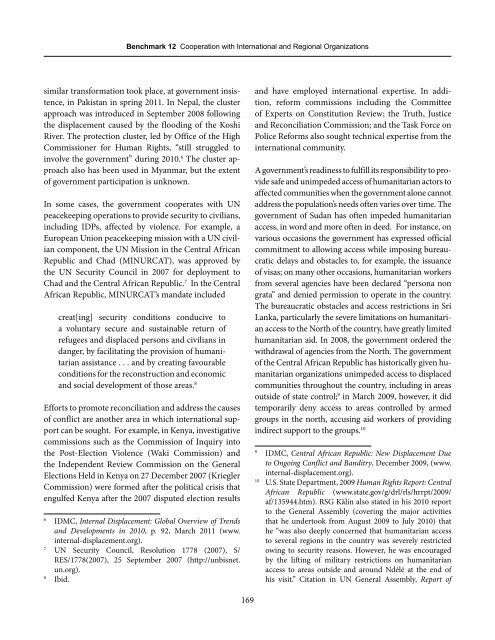From Responsibility to Response: Assessing National - Brookings
From Responsibility to Response: Assessing National - Brookings
From Responsibility to Response: Assessing National - Brookings
You also want an ePaper? Increase the reach of your titles
YUMPU automatically turns print PDFs into web optimized ePapers that Google loves.
Benchmark 12 Cooperation with International and Regional Organizations<br />
similar transformation <strong>to</strong>ok place, at government insistence,<br />
in Pakistan in spring 2011. In Nepal, the cluster<br />
approach was introduced in September 2008 following<br />
the displacement caused by the flooding of the Koshi<br />
River. The protection cluster, led by Office of the High<br />
Commissioner for Human Rights, “still struggled <strong>to</strong><br />
involve the government” during 2010. 6 The cluster approach<br />
also has been used in Myanmar, but the extent<br />
of government participation is unknown.<br />
In some cases, the government cooperates with UN<br />
peacekeeping operations <strong>to</strong> provide security <strong>to</strong> civilians,<br />
including IDPs, affected by violence. For example, a<br />
European Union peacekeeping mission with a UN civilian<br />
component, the UN Mission in the Central African<br />
Republic and Chad (MINURCAT), was approved by<br />
the UN Security Council in 2007 for deployment <strong>to</strong><br />
Chad and the Central African Republic. 7 In the Central<br />
African Republic, MINURCAT’s mandate included<br />
creat[ing] security conditions conducive <strong>to</strong><br />
a voluntary secure and sustainable return of<br />
refugees and displaced persons and civilians in<br />
danger, by facilitating the provision of humanitarian<br />
assistance . . . and by creating favourable<br />
conditions for the reconstruction and economic<br />
and social development of those areas. 8<br />
Efforts <strong>to</strong> promote reconciliation and address the causes<br />
of conflict are another area in which international support<br />
can be sought. For example, in Kenya, investigative<br />
commissions such as the Commission of Inquiry in<strong>to</strong><br />
the Post-Election Violence (Waki Commission) and<br />
the Independent Review Commission on the General<br />
Elections Held in Kenya on 27 December 2007 (Kriegler<br />
Commission) were formed after the political crisis that<br />
engulfed Kenya after the 2007 disputed election results<br />
6 IDMC, Internal Displacement: Global Overview of Trends<br />
and Developments in 2010, p. 92, March 2011 (www.<br />
internal-displacement.org).<br />
7 UN Security Council, Resolution 1778 (2007), S/<br />
RES/1778(2007), 25 September 2007 (http://unbisnet.<br />
un.org).<br />
8 Ibid.<br />
169<br />
and have employed international expertise. In addition,<br />
reform commissions including the Committee<br />
of Experts on Constitution Review; the Truth, Justice<br />
and Reconciliation Commission; and the Task Force on<br />
Police Reforms also sought technical expertise from the<br />
international community.<br />
A government’s readiness <strong>to</strong> fulfill its responsibility <strong>to</strong> provide<br />
safe and unimpeded access of humanitarian ac<strong>to</strong>rs <strong>to</strong><br />
affected communities when the government alone cannot<br />
address the population’s needs often varies over time. The<br />
government of Sudan has often impeded humanitarian<br />
access, in word and more often in deed. For instance, on<br />
various occasions the government has expressed official<br />
commitment <strong>to</strong> allowing access while imposing bureaucratic<br />
delays and obstacles <strong>to</strong>, for example, the issuance<br />
of visas; on many other occasions, humanitarian workers<br />
from several agencies have been declared “persona non<br />
grata” and denied permission <strong>to</strong> operate in the country.<br />
The bureaucratic obstacles and access restrictions in Sri<br />
Lanka, particularly the severe limitations on humanitarian<br />
access <strong>to</strong> the North of the country, have greatly limited<br />
humanitarian aid. In 2008, the government ordered the<br />
withdrawal of agencies from the North. The government<br />
of the Central African Republic has his<strong>to</strong>rically given humanitarian<br />
organizations unimpeded access <strong>to</strong> displaced<br />
communities throughout the country, including in areas<br />
outside of state control; 9 in March 2009, however, it did<br />
temporarily deny access <strong>to</strong> areas controlled by armed<br />
groups in the north, accusing aid workers of providing<br />
indirect support <strong>to</strong> the groups. 10<br />
9 IDMC, Central African Republic: New Displacement Due<br />
<strong>to</strong> Ongoing Conflict and Banditry, December 2009, (www.<br />
internal-displacement.org).<br />
10 U.S. State Department, 2009 Human Rights Report: Central<br />
African Republic (www.state.gov/g/drl/rls/hrrpt/2009/<br />
af/135944.htm). RSG Kälin also stated in his 2010 report<br />
<strong>to</strong> the General Assembly (covering the major activities<br />
that he under<strong>to</strong>ok from August 2009 <strong>to</strong> July 2010) that<br />
he “was also deeply concerned that humanitarian access<br />
<strong>to</strong> several regions in the country was severely restricted<br />
owing <strong>to</strong> security reasons. However, he was encouraged<br />
by the lifting of military restrictions on humanitarian<br />
access <strong>to</strong> areas outside and around Ndélé at the end of<br />
his visit.” Citation in UN General Assembly, Report of

















